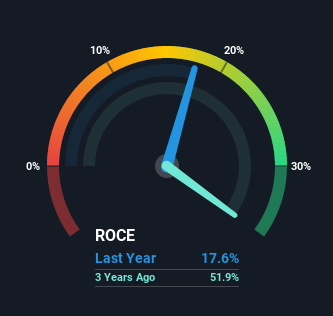- Hong Kong
- /
- Construction
- /
- SEHK:9979
There Are Reasons To Feel Uneasy About Greentown Management Holdings' (HKG:9979) Returns On Capital
If you're looking for a multi-bagger, there's a few things to keep an eye out for. Firstly, we'll want to see a proven return on capital employed (ROCE) that is increasing, and secondly, an expanding base of capital employed. This shows us that it's a compounding machine, able to continually reinvest its earnings back into the business and generate higher returns. Having said that, from a first glance at Greentown Management Holdings (HKG:9979) we aren't jumping out of our chairs at how returns are trending, but let's have a deeper look.
What is Return On Capital Employed (ROCE)?
If you haven't worked with ROCE before, it measures the 'return' (pre-tax profit) a company generates from capital employed in its business. The formula for this calculation on Greentown Management Holdings is:
Return on Capital Employed = Earnings Before Interest and Tax (EBIT) ÷ (Total Assets - Current Liabilities)
0.18 = CN¥544m ÷ (CN¥5.2b - CN¥2.1b) (Based on the trailing twelve months to June 2021).
Thus, Greentown Management Holdings has an ROCE of 18%. In absolute terms, that's a satisfactory return, but compared to the Construction industry average of 8.7% it's much better.
View our latest analysis for Greentown Management Holdings

Above you can see how the current ROCE for Greentown Management Holdings compares to its prior returns on capital, but there's only so much you can tell from the past. If you'd like to see what analysts are forecasting going forward, you should check out our free report for Greentown Management Holdings.
So How Is Greentown Management Holdings' ROCE Trending?
When we looked at the ROCE trend at Greentown Management Holdings, we didn't gain much confidence. Over the last three years, returns on capital have decreased to 18% from 52% three years ago. However, given capital employed and revenue have both increased it appears that the business is currently pursuing growth, at the consequence of short term returns. And if the increased capital generates additional returns, the business, and thus shareholders, will benefit in the long run.
On a related note, Greentown Management Holdings has decreased its current liabilities to 40% of total assets. So we could link some of this to the decrease in ROCE. What's more, this can reduce some aspects of risk to the business because now the company's suppliers or short-term creditors are funding less of its operations. Since the business is basically funding more of its operations with it's own money, you could argue this has made the business less efficient at generating ROCE. Either way, they're still at a pretty high level, so we'd like to see them fall further if possible.
In Conclusion...
While returns have fallen for Greentown Management Holdings in recent times, we're encouraged to see that sales are growing and that the business is reinvesting in its operations. Furthermore the stock has climbed 65% over the last year, it would appear that investors are upbeat about the future. So while investors seem to be recognizing these promising trends, we would look further into this stock to make sure the other metrics justify the positive view.
One more thing to note, we've identified 2 warning signs with Greentown Management Holdings and understanding them should be part of your investment process.
For those who like to invest in solid companies, check out this free list of companies with solid balance sheets and high returns on equity.
New: Manage All Your Stock Portfolios in One Place
We've created the ultimate portfolio companion for stock investors, and it's free.
• Connect an unlimited number of Portfolios and see your total in one currency
• Be alerted to new Warning Signs or Risks via email or mobile
• Track the Fair Value of your stocks
Have feedback on this article? Concerned about the content? Get in touch with us directly. Alternatively, email editorial-team (at) simplywallst.com.
This article by Simply Wall St is general in nature. We provide commentary based on historical data and analyst forecasts only using an unbiased methodology and our articles are not intended to be financial advice. It does not constitute a recommendation to buy or sell any stock, and does not take account of your objectives, or your financial situation. We aim to bring you long-term focused analysis driven by fundamental data. Note that our analysis may not factor in the latest price-sensitive company announcements or qualitative material. Simply Wall St has no position in any stocks mentioned.
About SEHK:9979
Greentown Management Holdings
An investment holding company, provides project management services in the People’s Republic of China.
Excellent balance sheet and good value.
Market Insights
Community Narratives



